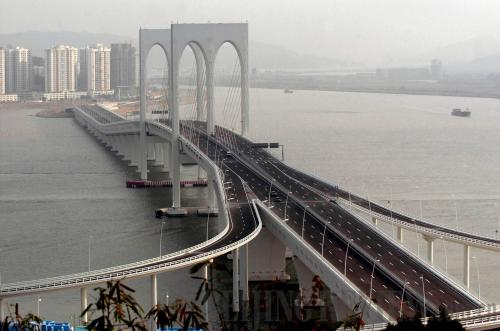|
 |
|
BRIDGE TO FORTUNE: The West Bay Bridge, which stretches 2,200 meters, is Macao's third that links the Macao Peninsula to the region's Taipa Island, on December 17, 2004 (XINHUA) |
Over the 10 years since Macao's return to China in 1999, the former Portuguese colony has witnessed nothing less than an economic miracle. Macao's gross domestic product (GDP) tripled during that period and reached MOP171.87 billion ($21.48 billion) in 2008, growing at an average rate of nearly 15 percent per year. The 2008 per-capita GDP of Macao, which lies west of the Pearl River and is China's second special administrative region on the southeast coast of the country, stood at $39,036, a figure that ranks it second in Asia behind only Japan.
With government coffers expanding from growing tax revenues collected from the gaming industry, the social welfare system in the region, which is home to 549,000 residents, has also improved dramatically in recent years. Beginning in the fall of 2007, the Macao Special Administrative Region (SAR) Government began offering 15 years of free education from kindergarten to senior high school.
The Macao SAR Government initiated a "wealth share" handout program in 2008 to allow the public to benefit from its strong budget surplus. Under the program, residents were given MOP5,000 ($625) per person in 2008 and MOP6,000 ($750) per person in 2009. In both years, non-permanent residents received half of that sum.
In October, Macao announced a plan to open individual retirement accounts in the central savings regime for the residents of Macao. The government immediately injected MOP3.3 billion ($412.5 million) into the new system, which amounted to MOP10,000 ($1,250) per account. The money was allocated from the MOP25.1 billion ($3.14 billion) budget surplus recorded in 2008. Money in the accounts for all residents 22 years old and higher can be withdrawn once the beneficiary reaches the age of 65. The government calls this measure a new form of retirement social security for Macao's residents.
Speaking at the Legislative Assembly in his final official meeting with the local parliament on November 19, Macao's Chief Executive of 10 years, Edmund Ho Hau Wah, said he estimated that 2009 would see a surplus of MOP10 billion ($1.25 billion), according to the Macao News Agency.
"Next year, the government will continue to implement measures for exemption and reduction of taxes that it has adopted over the last few years, with the aim of helping companies and citizens to face the pressures and difficulties resulting from the international financial crisis," he said.
Celebrations of the 10th anniversary of Macao's return to its motherland included a December 4 seminar in Beijing on the 10th anniversary of the implementation of the Basic Law of the Macao Special Administrative Region, where China's top legislator, Wu Bangguo, delivered a speech reviewing progress made in Macao over the past decade. On December 11, a photo exhibition on Macao's achievements in the last 10 years opened at Beijing's Capital Museum.
New era
Late Chinese leader Deng Xiaoping first put forward the concept of one country, two systems in the early 1980s to achieve China's reunification. Deng envisioned the main part of the country continuing under socialism while areas such as Hong Kong, Macao and Taiwan having their own capitalist economic and political systems. Under Deng's framework, SARs were established in Hong Kong and Macao respectively, and SAR governments were allowed to exercise a high degree of autonomy.
"While giving Macao a lot of support whenever there was a major setback, such as the outbreak of severe acute respiratory syndrome and the international financial crisis, the Central Government has strictly followed the one country, two systems policy and the Basic Law of the Macao Special Administrative Region. It has never interfered with the SAR Government's administration of Macao's own affairs," said Macao's Ho.
|
